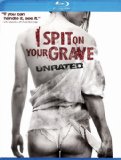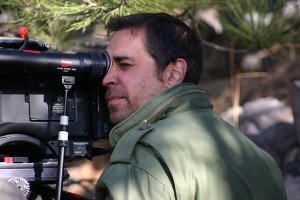 Disc Dish spoke with veteran camera operator turned director Steven R. Monroe, who helmed the 2010 version of I Spit on Your Grave, a remake of Meir Zarchi’s violent and disturbing 1978 rape-and-revenge cult movie. With past directorial credits that include the relatively benign SyFy Channel thrillers Ice Twisters and Storm Cell, we were interested in speaking with the kind of filmmaker who would, well, make a second version of I Spit on Your Grave, which is now available on DVD
Disc Dish spoke with veteran camera operator turned director Steven R. Monroe, who helmed the 2010 version of I Spit on Your Grave, a remake of Meir Zarchi’s violent and disturbing 1978 rape-and-revenge cult movie. With past directorial credits that include the relatively benign SyFy Channel thrillers Ice Twisters and Storm Cell, we were interested in speaking with the kind of filmmaker who would, well, make a second version of I Spit on Your Grave, which is now available on DVD and Blu-ray
from Anchor Bay!
Disc Dish: With a resume that includes a lot of TV work including five TV Movies for the SyFy Channel, an I Spit on Your Grave remake doesn’t seem to fit in!
 Steven R. Monroe: It’s weird — my career has definitely been interesting. When I was in the camera department, I did a lot of TV and features. When I started directing, I wanted to do both television and movies and my very first film, House of 9, was a very violent film. I did several other films and then I got offered a lot of TV films, so I did a lot of SyFy things. If you kind of look through the list, it kind of makes sense.
Steven R. Monroe: It’s weird — my career has definitely been interesting. When I was in the camera department, I did a lot of TV and features. When I started directing, I wanted to do both television and movies and my very first film, House of 9, was a very violent film. I did several other films and then I got offered a lot of TV films, so I did a lot of SyFy things. If you kind of look through the list, it kind of makes sense.
DD: Still, I Spit on Your Grave, both Zeir Marchi’s 1978’s original and your remake, pack quite a punch.
SM: Anyone who knows me knows that I love the films of the 1970s, when films were f***ing great. I like films that push buttons and that force viewers to think. [I Spit on Your Grave] was a perfect opportunity to do this.
DD: The rape in the 1978 version is quite a disturbing and lengthy scene. And while the rape is still upsetting in your version, there’s more a focus on the revenge aspect of the story this time around. The original also includes time spent with the victim immediately following the rape, which isn’t in the new version
SM: It was a very conscious choice to not linger on the rape or the immediate aftermath; that was mostly decided between the producers and writer. Once the rape was over, it was going to turn into a crime story and even almost a ghost tale. There was a post-rape scene in place that we cut out because it undermined the emotional impact of the rest of the story. We wanted to move forward immediately into the revenge part of the story.
DD: Meir Zarchi was the executive producer of his own film’s remake. What was it like to work with him?
SM: Meir was great, though we started off a little rocky. Initially, he didn’t want me to direct after seeing some of my prior films. After some discussions with [executive producer] Lisa Hansen, it was clear that he didn’t like the handheld camera or long lenses that I use. But after he saw the first couple of days of dailies — he was on the set for a few days early on — he came up to me, hugged me, kissed me, told me he loved it. I’m sure it was very hard for him to let go of the original film, which defined him as an artist and a filmmaker.
